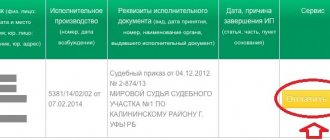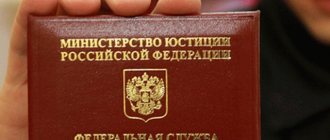How to legally not pay under a writ of execution
Unpleasant conversations with banks, communication with debt collectors, and protracted lawsuits can unsettle anyone.
Therefore, when the debtor receives a writ of execution, he is in a depressed state. In such cases, experts advise not to give up and contact a professional lawyer. Together with a lawyer, you can individually analyze the current situation. There is a chance that there will be some loopholes that will help delay debt payments. It is quite legal not to pay under a writ of execution, for example:
- the debtor is raising a young child on his own;
- lives on subsidies from the state;
- the defaulter is temporarily unemployed;
- the debtor has other debts. He does not have any money left above the subsistence level;
- a citizen is undergoing bankruptcy proceedings;
- filed a lawsuit to obtain a deferment;
- undergoing inpatient treatment in a medical institution;
- his property or child is wanted or is being sought;
- filed a request to suspend the proceedings due to military service.
What else can the debtor do? For example, get a deferment or installment plan to repay a debt.
Based on Art. 37 of Law No. 229-FZ, the debtor has the right to file an application with the court for a deferment or installment plan. In this case, the forced collection is terminated for a period determined by the court.
Alternatively, you can reach an agreement with the creditor. If a compromise can be reached, the claimant may withdraw his application to initiate proceedings.
Information base of information on the presence of debt of the Federal Bailiff Service
At the same time, debtors who have not fulfilled their financial obligations may evade their fulfillment not because of the presence of such an intention, but due to a combination of certain circumstances. For example, if a citizen does not live at his place of permanent registration, but rents housing from another owner, he may not receive written notifications sent to him by post, and therefore is deprived of the opportunity to find out about debts. Receiving such notifications will be difficult, and if debtors are on a long business trip or leaving the city for other reasons: in such a situation, information about whether they have overdue debts will also not be available to them.
In such a situation, the creditor to whom the debtors have debts, according to established practice, must first try to settle the existing debt out of court. If such attempts were made by him, but did not bring the expected result, such a person has the right to apply to a judicial authority with a statement of claim and recovery of funds due to him from debtors.
We recommend reading: How much will discounted train travel cost for pensioners in St. Petersburg in 2020?
Ineffective payment deferment methods
Often debtors do not take the court order to initiate enforcement proceedings seriously enough. In this case, they are in no hurry to understand the requirements specified in the writ of execution and other subtleties of the case, but resort to common methods of defense that will never bring the desired results if the bailiff works diligently. Here is an example of the most common of these lines of defense:
It will resolve itself.
“Perhaps, if you don’t pay attention to the impending court proceedings, the writs of execution received and the threatening promises of the bailiff, the collectors will understand that you have no money or desire to have common business with them in the future, and will leave?” - the inactive debtor probably thinks. It is very unlikely that this will happen. Most likely, the bailiffs will seize all your bank accounts and even your salary card, and if the seized funds are not enough to pay the debt, they will begin to confiscate property or initiate criminal proceedings against you.
Right to be ignored
What if you deliberately do not receive all the writs of execution that are sent, ignore calls from the bailiffs, do not open the door to the official when he visits your home and do not go to the bailiff when he invites you to his place? The law has long been abolished that debt payments cannot be forcibly withdrawn from a person who has not personally verified his or her knowledge with a signature. If you do not want to cooperate with the bailiff for a long time, you will automatically be considered a notified person after complying with all formalities.
The deal is more valuable then money
If the amount of debt is large enough, then perhaps it makes sense to reach an amicable agreement with the bailiff in charge of your case? This method is good only until the debt collector understands that the executive is in no hurry to collect the debt. Your entire hard-won line of defense will instantly fall under the arsenal of an ordinary Complaint about the inaction of the executive, which will either force the bailiff to move, or will be the basis for replacing the official in charge of this case. Ultimately, the debtor will still have to pay the debts.
Ineffective methods not only delay debt repayment for a completely insignificant period of time, but also cause psychological discomfort for the debtor, unnecessary worries and fears.
You might be interested
about the author
Traveling from Russia abroad with debts in 2020
Usually, citizens themselves know about late payments on loans or rent, unpaid alimony and outstanding fines. And they are also most often aware of the consequences that usually arise due to debts: court decisions arrive by mail, the bailiff sends a summons, and so on. But there are times when debt becomes an unpleasant surprise. For example, a person does not live at the place of registration, letters about payment of fines from the traffic police or other authorities simply do not reach him. Or the ex-wife may unexpectedly file for alimony, and this fact will remain unknown to the defendant. There are plenty of options.
- through Sberbank Online, for Sberbank clients there is also a corresponding tab in their personal account;
- through the FSSP mobile phone application;
- through a payment system (Yandex. Money, Qiwi, WebMoney, Robokassa);
- on a printed receipt at any bank branch.
We recommend reading: Agreement on the transfer of rights and obligations under a work contract sample
Choose the right legal specialization!
- Real Estate Lawyer
- Lawyer for inheritance cases
- Land Lawyer
- Housing lawyer
- Family lawyer
- Civil lawyer
- Criminal lawyer
- Traffic accident lawyer
- Automotive lawyer
- Insurance lawyer
- Labor Lawyer
- Credit lawyer
- Arbitration lawyer
- Medical lawyer
- Consumer rights Protection
- Military lawyer
A common situation is that the bank goes to court. The case was “successfully” lost, and the writ of execution was sent to the FSSP service. This is the final part of the bank foreclosure. The borrower has ten days to voluntarily pay the debt. If this does not happen, the debtor will face problems.
The defendant decided not to wait for the bailiffs at home, and came to the department on his own. It is necessary to understand what model of behavior to choose to negotiate in your favor.
To prevent the bailiff from seizing the property, payment must be made within five days from the date of notification of the initiation of enforcement proceedings. It is not necessary to pay the entire amount, a small contribution is enough.
The debt is repaid, but the bailiffs do not remove it from the database
You can also easily write a statement or complaint by registering on the FSSP website and sending your appeal through your personal account, it will be faster. On the same website you can familiarize yourself with a sample form of a complaint against the actions or inactions of a bailiff.
Next, you must take a document confirming the absence of debt, for example, a certificate is issued from the bank, or a certificate of absence of debt can be issued from the traffic police or from the housing office, in any case, after fulfilling the obligation, a certificate must be obtained, without it, enforcement proceedings cannot be completed .
We recommend reading: Foreclosure Can Be Filed for the Obligations of One of the Spouses
Paying debt in installments
A common option. The bailiffs reach an agreement with the debtor, this is convenient:
- the debtor came himself;
- The debt is slowly being paid off.
The debtor also benefits:
- no one will go to his home to seize his property;
- no one will send a writ of execution to work to withhold 50% of the salary. The debtor's business reputation will remain untouched.
- Take your 2NDFL certificate with you to confirm your income.
- If you have loans from other banks, take the agreements with you.
- Indicate additional sources of income. This is done if you are determined to pay off the debt.
Talk to the bailiff and, taking into account your income, calculate the monthly payment. This is a normal move. People pay off debts this way. If FSSP employees see the payment, they will not bother you.
If in this way you are repaying a debt to an individual or legal creditors, then it is important to remember:
The plaintiff may request additional collection measures even if funds are regularly received as payment. The bailiff is obliged to obey and carry out a set of compulsory measures.
Can the bank sue me if I only pay 100 rubles on the loan?
This is because this is not a sufficient amount to pay off the loan amount. Often it does not even allow you to cover the interest on the loan. But she shows her intention to fulfill the financial obligations of her loan. If possible, you should try to cover at least the loan amount or interest every month (see the amounts in the payment schedule).
All this led to people being forced to reduce their monthly spending. But this doesn’t help much if a person has at least one loan hanging on him. Considering that just shortly before the onset of the crisis, people began to actively apply for bank loans, one can imagine how many borrowers find themselves in a difficult financial situation today.
This is interesting: Until How Old Is The Child Dependent?
Bottom line
If you come to an appointment at the FSSP to talk, do it as friendly as possible. Don't be rude. A bailiff is a person who can make life very difficult. Although his actions are disputed. Or, on the contrary, it can help with debt repayment.
- If the debt is fully repaid, the money will be credited to the account within seven working days. Don't forget to inform the bailiff about the payment.
- Partial payment is possible only by agreement.
- If you cannot or do not want to pay, do not aggravate the situation by visiting the SSP. It's better to leave everything as is.
- Installment payment can be obtained by law through court proceedings.
- Payment without commission is not possible, only directly to the lender by agreement.
In any case, whether you pay or not, BSC employees play an important role. But ultimately, this is just an obstacle to a debt-free life that can be intelligently bypassed or passed through by picking up the keys to a closed door.
The Federal Bailiff Service (FSSP) is an executive instrument of government whose task is to implement court decisions. Therefore, after the creditor or other interested party initiates enforcement proceedings, the bailiff begins working with the defaulter so that the latter pays off debt obligations.
Often, debtors are ready to pay their debt, but for some reason cannot make payments on time or in full. Therefore, such citizens need to know how to legally not pay under a writ of execution, since even debtors have the right to their protection.
Is it possible not to pay bailiffs?
After the enforcement proceedings began, the bailiff in accordance with paragraph 12 of Article 30 of Law No. 229-FZ of October 2, 2007. provides the defaulter with 5 days from the date of receipt of the writ of execution to repay the debt. If, within the established period, the citizen voluntarily fails to comply with the court order, then forced collection of the debt is initiated. Thus, it will not be possible to avoid paying off the debt. However, it is possible to either temporarily or completely stop production.
According to Law No. 229-FZ (clause 1 of Article 40), enforcement proceedings must be suspended in whole or in part in the following cases when the debtor:
- died or went missing;
- lost his legal capacity;
- participates in hostilities or performs tasks during a state of emergency or martial law;
- represents a credit institution that has lost its license to carry out the specified activity;
- undergoing bankruptcy proceedings;
- filed a lawsuit to obtain a deferment or installment plan for making cash payments;
- received notice of seizure of his property.
In accordance with paragraph 2 of Article 40 of the same law, enforcement proceedings may be suspended in whole or in part in the following cases, when the defaulter:
- undergoing inpatient treatment in a medical institution;
- his property or child is wanted or is being sought;
- filed a request to suspend the proceedings due to military service.
It is worth noting that even a complete cessation of proceedings does not relieve a citizen from responsibility for paying debt obligations, since the creditor can re-initiate the resumption of the enforcement process.
How not to pay under a writ of execution: legal methods
To legally avoid paying a debt under a writ of execution, you can do the following.
- Contact a lawyer
Professional legal assistance from a specialist can help resolve this issue, since the lawyer will study the specifics of the situation of a particular debtor. The lawyer will compare the citizen’s case with the legislative framework and give valuable recommendations on how to at least get a deferment of payments. Often the court takes the side of the accused in cases where the latter is raising a minor child alone, receives subsidies from the state as the only source of income, etc.
- Get a deferment or installment plan for debt repayment
Based on Art. 37 of Law No. 229-FZ, the debtor has the right to file an application with the court for a deferment or installment plan. In this case, the forced collection is terminated within the period established by the court.
- Negotiate with the claimant
The claimant can be either a legal entity or an individual. But regardless of this, the debtor has the opportunity to negotiate with him. If a compromise can be reached, the claimant may withdraw his application to initiate proceedings.
If you pay the bailiffs monthly
When credit debts are submitted for enforcement, the borrowers-debtors no longer communicate with bank employees, but with bailiffs. And here many people have a question: “How not to pay a debt to the bailiffs?” The Federal Law “On Enforcement Proceedings” provides a scope of powers to apply enforcement measures, including foreclosure on the property and income of the debtor.
This is interesting: How much do the widows of Chernobyl victims receive from health damage in the growth of the region?
Today, after activating the card, I discovered that instead of 6000 there is minus 14900. After calling SSP, it turned out that the account was seized due to a writ of execution (my topic is about this writ of execution). and the next 2-3 months. everything that is credited will be debited from the account.
I didn’t bring a receipt for payment, the FSSP hit me 30 thousand
When is the best time to check debts to bailiffs? When is the best time to check debts to bailiffs? Of course, you can wait for the “letter of happiness” and after receiving it, putting aside all matters and worries, take measures to pay off the debt. However, it is much more effective to check for debts to bailiffs yourself.
The check will take literally a few minutes and, if the results are not the most positive, they will save you a lot more time.
“Payment for State Services” allows everyone to check the debt from the FSSP online by simply indicating the series and number of their passport or TIN in a special form. You will receive all the necessary information completely free of charge and almost instantly, and also, if you have a debt, you can pay it off immediately.
Ineffective measures to prolong obligations
Every citizen entering into a transaction with an obligation to pay should be informed in advance about the consequences of failure to fulfill this obligation. It is important to know the importance of executive actions.
You should also familiarize yourself with the terms of reference of the bailiff. Unfortunately, this is not always done, so there are often cases of attempts to extend the payment period in an inappropriate way.

Hope for a positive outcome
Sometimes debtors believe that there is nothing wrong with the beginning of enforcement actions, and collection will be carried out by voluntary consent, so many do not fulfill their obligations, not being interested in the consequences.
What happens if the debtor ignores the demands of the bailiffs to make payments?
The consequences are:
- the subject of recovery will be the debtor's property, to which arrest, forced seizure and sale at auction may be applied;
- forced deductions will arise from the income received by the debtor;
- in addition to the debt, you will have to pay an additional fee applied by the bailiffs;
- travel outside Russia will be prohibited;
- Driving will be temporarily prohibited.







